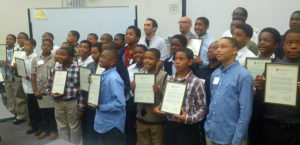 You have already made the very “out of the box” decision to enroll your child in a language immersion program. If this is your child’s first year congratulations on deciding to give your child the gift of a bilingual education. If this is your child’s first of many school years in a language immersion we hope you find these tips helpful in starting your child off in another great year at their program.
You have already made the very “out of the box” decision to enroll your child in a language immersion program. If this is your child’s first year congratulations on deciding to give your child the gift of a bilingual education. If this is your child’s first of many school years in a language immersion we hope you find these tips helpful in starting your child off in another great year at their program.
1. Meet with Your Child’s Teachers:
No one knows your child better than you do. Schedule a time to meet with your child’s teachers – formally or informally. Take the time – when they are not busy meeting with other parents or preparing their curriculum – to say hi and to check in regarding your child.
It is important to help guide your child’s year by letting the teacher know some of your expectations of the year in a very friendly and non-confrontational way. Don’t wait for the school to initiate a meeting and don’t wait for parent/teacher conferences. Start the dialogue now. Develop a relationship with both their English and Chinese teachers. Share with them about your child’s strengths, the forms of redirection that they are most responsive to and highlight for them that it is your intent to partner with them to help your child succeed in their classroom.
If your child has two teachers it is sometimes easier to develop a relationship with the English Language Teacher. Please make every effort to establish a relationship with both teachers. If you are a monolingual parent make an extra effort to establish a relationship with the Chinese Language Teacher. Establishing positive relationships now will assist you and the teacher in maximizing your child’s experience in the classroom.
The best question you can ask your child’s teacher is “What can I do to support my child’s success in your classroom?” That’s the question every teacher wants to hear!
2. Establish a Morning and Evening Routine:
This seems obvious but with the crazy busy schedule that most families have this is often one that gets lost in the every day shuffle. It gets especially hard with the addition of extra-curricular activities – soccer, piano, martial arts, and your work demands.
In the evening do as much as you can to prepare for the next day. Have your children organize their backpack and place it near the front door. If they take a sack lunch to school put as much together the night before to minimize demands on your morning routine. As you start the new year try to make your morning routine as simple and predictable as possible. Most importantly wake up and get dressed before it is time for your child to wake up. It reduces the stress of the morning routine because you don’t have to yell orders at them while you are trying to iron your clothes, shave or apply your make up.
Every night put your keys and wallet in the same place to reduce any out the door hiccups.
3. Read! Read! Read!
I hope we all understand the fundamental importance of reading with your child. Have your child read 15-20 minutes a day (1st grade and beyond). The more often your child reads the better your child reads and the more your child loves to read. Make this a special time. Create a safe and special place for your child to read. If your child is a beginning reader (regardless of age) snuggle with them as they read out loud so you can support, encourage and monitor their emerging reading skills.
Don’t forget to provide them with opportunities to read in Chinese. You don’t have to know how to read Chinese to have your child read to you. Open a book or handout provided by their teacher and encourage them to read 10-15 minutes a day (even if they read the same passage a few times). This allows your child extra practice, it assures them that their Chinese reading progress is also important to you and it helps you to support your child’s Chinese language learning.
4. Develop Good Homework and Study Habits:
Schedule ample time for homework and create an environment that is conducive to doing homework. Limit TV and other electronic distractions. Make your best effort to be available to answer questions and offer assistance – but do not do your child’s homework for them. If they are working for long periods and they seem figity or display fatigue give them a break – close the book for a few minutes, stretch, etc. A periodic break will not be too disruptive. When your child is finished with their work take time to help them organize their work – checklists, timers and parental supervision are great tools to help overcome homework problems. Be sure to establish a good sleep routine. Insufficient sleep is associated with lower academic achievement. Optimal sleep times are 10-11 hours a day for children between 7 to 12 years of age and 8-9 hours a day for children between 12 and 18 years of age.
Consider hiring a tutor if your child is struggling in certain areas. Talk to the teacher first and check in with administrators, school counselors, health care providers and other parents to see what resources are available and to obtain referrals.
5. Establish a Network / Join PAASSC!
We all know that it takes a village to raise a child. Reach out to other parents at your school to establish play dates and to strengthen social relationships. One study of African American students at elite private schools identified that “a strong sense of connection to the school community” is a strong sign of the child’s academic success. We have chosen schools for our children where there are often few African American faces. It is important to build relationships so that they see their school community as an extension of themselves and their journey.
PAASSC is looking for volunteers to help establish five new charters over the next two years. If you are interested in helping us develop an application and screening process to create these charters and supportive environments for African American youth learning Chinese please contact me (jamila@paassc.com).
 On October 16, 1968, Sprinters Tommie Smith and John Carlos, gave this iconic salute during the medal ceremony at the Olympics in Mexico City.
On October 16, 1968, Sprinters Tommie Smith and John Carlos, gave this iconic salute during the medal ceremony at the Olympics in Mexico City.





